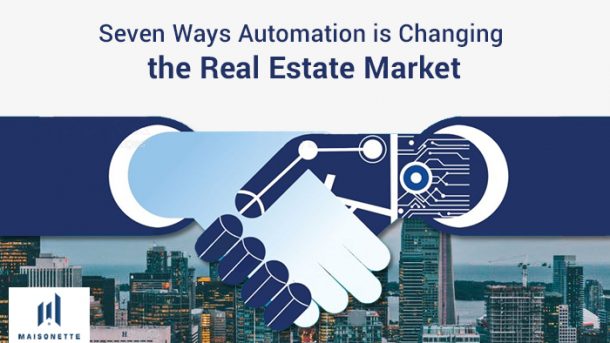Real estate business is dynamic and one of the most significant time constraints real estate professionals are facing is the day-to-day management of process like handling multiple projects, tracking different locations, keeping update inventories, selling the property, finding tenants, getting investors on board for new developments among many others.
The good news is that there is real estate automation solutions are making life easier for the real estate professionals. Online Real Estate Software Companies offer automated solutions for various real estate complex processes, which are often interlinked to each other.
Automation and use of technology improve communication and reduces friction for managing the market for real estate companies. A look at seven ways how real estate market is changing using business process automation to take their organization to the next level:
1. Property Management:
With the ever-increasing use of technology, the way people are looking for properties for rent, lease or buy has changed drastically which often starts with a search query to find suitable listings on the internet.
Real estate businesses are now opting online integrated web applications for managing their property listings be it office space, warehouses, agricultural, commercial or residential properties for both sales & leasing.
For every property listing, the users can also view google map for locations, images, the age of the property, floor plans, amenities and associated documents, etc. The prospective customers can search properties & make online inquiries.
2. Business Processes & Automated Workflows
The real estate business can be managed well using a Property Management Software. Tracking the progress of ongoing projects, the property constructions, property details, renewals of agreements, emails, tasks, documents and all other associated activities are centralized.
Automated workflows can ease real estate companies to manage the staff workloads efficiently. Regular reminders and notifications can be sent to the staff as well as the management of various activities.
Based on the requirement, the real estate professionals can configure their daily activities. Property Management Software can aggregate data and send automated reports to the managers & executive.
3. Leads & Marketing for Properties
One of the most crucial tasks for real estate companies is to manage their marketing & sales activities efficiently. Generating high-quality leads from multiple campaigns is essential for improving sales.
Campaigns can be managed from an Online Property Management Software. The property listings can be uploaded on a dynamic website with images, google map integration for locations and other documents which results in enquires and qualified leads from the web.
The ROI from various property campaigns, their results and business impact can be aggregated and analyzed.
4. Vendors, Subcontractors, and Bill of Materials
It is critical to have a system that can help to streamline all communication with vendors, subcontractors, and bill of materials information. All vendor profiles, inventory details, and rate history can be tracked with the centralized Property Management Software for placing purchase orders for different projects.
The subcontractor agreements and progress for various projects can be done with ease using Property Management Software. For any project, the consumption status and bill of material are available, resulting in increased transparency & right use of the inventory.
The workflow automation can be configured to pick up any extreme variances in material costs or quantity and immediately notify it to the management or supervisors.
5. Accounting & Financial Analysis
A centralized and online accounting Property Management Software is a must for a real estate business these days. Using ERP software for real estate, the budgeting & forecasting can be done for various projects with ease.
The procurement can be driven by Property Management Software resulting in optimised acquisition to maximise the cash flow for the business. All material billing, machinery, vehicle deployments and workforce costs for projects are tracked. All accounts payable and receivable are maintained in one place.
Regulatory standards and Taxation are also enforced as part of Property Management Software. For controlling costs, workflow settings can be enabled to notify the designated authority for purchases & approvals for any transactions.
6. Contracts & Legal Documentation
When managing multiple sites and locations, it is essential to have access to crucial documents remotely. The contracts and legal documents for properties are prepared with extreme confidentiality. The compliance requirements are critical for every project.
Licenses, agreements, sale deed, subcontractor agreements, loan related documentation can all be aggregated with an integrated Property Management Software. Searching and finding information for any property like the age of the property, location details, floor plan, title deed, etc. can be simplified and accessed from anywhere and anytime.
7. Valuation & Advisory Services
It is imperative to know the worth of your assets. Estimating the right costs and value of your assets can have significant financial entanglements. The current value of the assets defines the costs of renting, leasing, or selling the properties.
The property owners employ valuation and advisory services for assessing the worth of their properties. The estimate of the property typically involves valuers for this process. The entire process of valuation report can be automated.
The valuation process empowers property owners to estimate the value of their real estate assets. The valuation process helps them to prepare a roadmap and financial analysis for properties.
The property owners can take decisions whether to rent, lease or sell assets and costs for the same depending on these valuations.
Automation in real estate industry is driving the real estate companies to new heights today. The capabilities of technology are redefining the way people negotiate and manage things. Real estate industry is also profiting from these developments.
The core business activities for finding qualified leads for properties, managing projects, selling properties, portfolio, and asset management can be simplified a great deal with automation.
Enhanced communications, service delivery, time to market and new avenues for growth is driving the real estate market to adopt Automation.

No Comments, Be The First!